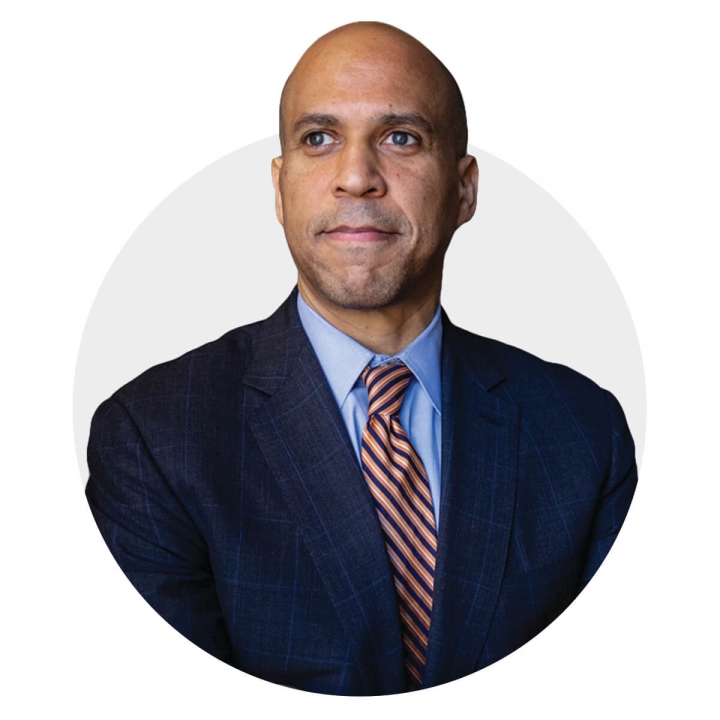Cory Booker on Criminal Justice Reform
Booker is the author of the 2018 First Step Act, which aims to reduce federal mass incarceration by reducing and restricting enhanced sentences for prior drug felonies, and through evidence-based treatment for opioid and heroin use. This was signed into law by President Trump.
In March 2019, Booker introduced the Next Step Act, which includes a number of criminal justice reforms, including reducing mandatory sentences for non-violent drug offenses, banning racial and religious profiling, removing questions regarding conviction histories from job and other applications, and expunging records for marijuana-related charges.
Booker would eliminate the sentencing disparity between crack and powder cocaine.
Booker pledges to reinvest in the communities most impacted by the failed War on Drugs.
Booker would expand training for law enforcement officers on implicit racial bias, de-escalation and use-of-force.
Booker would decriminalize marijuana and expunge records for marijuana-related charges
Booker would extend clemency to individuals serving excessive sentences for nonviolent drug offenses.
Booker would end mandatory minimums for nonviolent drug offenses.
Booker supports removing questions regarding conviction histories from job and other applications.
Booker would prohibit racial and religious profiling and improve the reporting of police use-of-force incidents.
Booker would “absolutely” consider mass pardons or commutations for federal marijuana offenses.
“You can tell a lot about a country by who it incarcerates. Some countries imprison journalists. Others imprison political opponents. We imprison the poor, the addicted, the mentally ill, the survivors of abuse and sexual assault, and black and brown people. Our broken criminal justice system is a cancer on the soul of our nation that preys upon our most marginalized populations. It’s time we developed a cure.”
Cory Booker: It’s time for the next step in criminal justice reform
The Washington Post, March 10, 2019 | Cory Booker
Read More
Cory Booker is running for president in 2020. Here’s everything we know about the candidate and how he stacks up against the competition.
Business Insider, September 13, 2019 | John Haltiwanger and Joseph Zeballos-Roig
Criminal Justice
Cory Booker campaign website, 2019
Cory Booker takes the lead on criminal justice reform in 2020 campaign with new bill
CNBC, March 7, 2019 | Carmin Chappell
Cory Booker: It’s time for the next step in criminal justice reform
The Washington Post, March 10, 2019 | Cory Booker
Booker showcases pragmatic side in town hall
Politico, March 28, 2019 | Nolan D. McCaskill
Cory Booker on Overdose Prevention Sites
Booker has not explicitly endorsed safe injection sites in publications, but told a constituent, on video, that he supports them.
“I fought hard as a mayor to open our first needle exchange center. Safe injection sites, I’m fully in favor of them.”
Cory Booker Confronted By Girl On Substance Abuse
NowThis News, May 19, 2019
“It was a big mistake when it was made. We thought, we were told by the experts, that crack — you never go back; it was somehow fundamentally different. It’s not different, but it’s trapped an entire generation… [I] may not have always gotten things right.” – At a January, 2019 breakfast commemorating Martin Luther King Jr. in reference to the 1988 legislation. Source
Read More
Cory Booker Confronted By Girl On Substance Abuse
NowThis News, May 29, 2019
Cory Booker on HIV Getting to Zero
Booker pledges to “beat the [HIV] epidemic.”
Booker would remove barriers to accessing PrEP.
Booker pledges to halt all administration attacks on the Affordable Care Act and on Medicaid.
Booker plans to protect and fully implement programs that are important for those living with HIV and for preventing HIV, including the Ryan White AIDS program and the 340B program.
Booker would increase funding for HIV care and prevention.
Booker would work to pass comprehensive sex education legislation.
Booker promises HIV care will benefit by improved access to health coverage through his Medicare for All plan.
Booker would immediately fill vacancies on the Presidential Advisory Council on HIV/AIDS and seek advice and recommendations from the council on strategies for prevention, treatment, and research for HIV. When appointing members of the council, he pledges to seek leaders who would center the needs of communities that are disproportionately impacted by HIV, including LGBTQ+ communities and communities of color.
“We need to continue supporting evidence-based programs that we know work, which is why I support increasing our investments into the Ryan White Program and for networks of people living with HIV that provide peer support and combat stigma.”
Cory Booker Explains His HIV Policy Ideas
HIV+Magazine, September 9, 2019 | Jacob Anderson-Minshall
Read More
Corey Booker Explains His HIV Policy Ideas
HIV+Magazine, September 9, 2019 | Jacob Anderson-Minshall
2020 Presidential Candidate HIV Questionnaire
AIDS United, 2019
Cory Booker on Hepatitis C Treatment Access
Booker has not issued specific statements to this issue.
Cory Booker on Voting Rights Restoration
Booker supports enfranchising people with felony records.
Booker believes that people in prison for "serious felonies" surrender the right to vote while in prison, but those serving time for nonviolent drug offenses should be allowed to vote while they're in prison, primarily because he does not believe these offenders should be in prison in the first place.
“Where I begin all of this isn’t the fight to get people in prison their voting rights. It’s to get them out of prison. That’s my fight. We should have 50 percent reductions in incarceration, and that would still not be in line with the rest of the industrialized nations that do not incarcerate as many people…. Let’s start with the larger fight. Why are they going to prison in the first place for nonviolent drug offenses? Literally, now, two of the last three presidents have admitted to felony drug use, but they get to be president and low-income people, drug-addicted people, people with mental illness, they have to go to prison and not just lose their voting rights, but lose their absolute liberty.”
Cory Booker Wants To Allow Some Prisoners To Vote
Huffington Post, May 30, 2019 | Kevin Robillard
“You know, these felony disenfranchise laws – if you go back to some of the state legislative debates that were happening after Reconstruction, they were designed to stop African-Americans from voting. These have racist roots to these laws. And it gets to a point now where you can see the fruit of that poison tree – is that you have some counties in America where 1 out of 4 African-Americans can’t vote. And remember; the overwhelming number of charges are for nonviolent drug offenses. So here, you’ve served your time, and now you’re going to have 10, 20, 40, 50, 60 years more as an adult. And you’re told that your citizen rights have been stripped from you? This is a way, I think, that poor people especially – low-income people are being stripped of their democratic power.”
Sen. Booker To Propose Next Steps In Criminal Justice Overhaul
NPR, March 7, 2019 | Steve Inskeep
Read More
Cory Booker Wants To Allow Some Prisoners To Vote
Huffington Post, May 30, 2019 | Kevin Robillard
Cory Booker is running for president in 2020. Here’s everything we know about the candidate and how he stacks up against the competition.
Business Insider, September 13, 2019 | John Haltiwanger and Joseph Zeballos-Roig
Which 2020 candidates think incarcerated felons should be able to vote?
CBS News, June 14 2019 | Alexandra Chaidez
Cory Booker on Drug Decriminalization
Booker makes cannabis legalization a core policy, in order to address racial disparities in policing. He authored the 2017 Marijuana Reform Act, an approach to expunge criminal records for those with cannabis related offenses and legalize cannabis at a federal level.
Booker accused the federal government of undermining people with addiction through punishment rather than treatment in 2012.
“I get very angry when people talk about legalizing marijuana and then give no light to how marijuana law enforcement was done in ways that fed upon poor communities — black and brown communities,” Booker said. “This is a war on drugs that has not been a war on drugs — it’s been a war on people, and disproportionately poor people and disproportionately black and brown people.”
Why Cory Booker Declined to Co-Sponsor The New Marijuana Bill
Marijuana Merchant Account, April 24, 2019 | Brian Ellis
“I have a lot of respect for the Vice President [Biden]. He is – swore me into my office – is a hero. This week I hear him literally say that I don’t think we should legalize marijuana. I thought you [Biden] might have been high when you said it. Let me tell you, because marijuana in our country is already legal for privileged people… The War on Drugs has been a war on black and brown people. And let me just say this, with more African Americans under criminal supervision in America than all the slaves since 1850, do not roll up into communities and not talk directly to issues that are going to relate to the liberation of children, because there are people in Congress right now that admit to smoking marijuana while there are people, our kids who are in jail right now for those drug crimes.”
Read More
Presidential Candidates, the Election, and Drug Policy
Psychology Today, May 7, 2019 | Adi Jaffe, Ph.D.
Exclusive: Cory Booker says weed legalization must include justice for victims of war on drugs
Vice News, April 9, 2019 | Matt Laslo
Booker to Biden on not legalizing marijuana: ‘I thought you might have been high’
MSNBC, November 20, 2019
Cory Booker on Substance Use Treatment Access
Booker expects his health care plan to ensure access to treatment.
Booker is co-sponsor of the proposed CARE Act, which would commit $100 billion over 10 years to funding addiction treatment and harm reduction programs at the local, state, and federal levels.
Booker co-authored the SUPPORT for Patients and Communities Act, which enhances patient access to non-opioid treatment options and directs Medicaid to conduct a study on utilization management controls applied to medication-assisted treatment options in both fee-for-service and managed care Medicaid programs.
“We absolutely have to treat this issue as, at its core, a crisis of public health. The thinking behind the harsh sentencing laws of the 1980s and 90’s was sorely misguided, leading to a policy that was not only ineffective in reducing crime, but also disproportionately targeted at low-level, nonviolent drug offenders. These are the very individuals who would serve to benefit the most from a federal criminal justice policy that emphasizes treatment over punishment, providing resources to identify and treat incarcerated Americans suffering from drug addiction. By provisioning more resources for treatment, we can address the problem of recidivism – each year, around 600,000 Americans finish their prison sentences and re-enter their communities; but two out of every three are rearrested within three years of their release.”
Lessons from New Jersey: How U.S. Senator Cory Booker is Addressing Addiction
Center on Addiction, November 15, 2016 | Nkem Osian
Read More
How the Democratic presidential candidates would combat the opioid epidemic
Vox, September 10, 2019 | Geman Lopez
Lessons from New Jersey: How U.S. Senator Cory Booker is Addressing Addiction
Center on Addiction, November 15, 2016 | Nkem Osian
Cory Booker on Syringe Access
Booker supports needle exchange program legalization.
“As Mayor of Newark, I fought for and helped open the city’s first needle-exchange center and saw firsthand how effective they could be.”
Cory Booker Explains His HIV Policy Ideas
HIV+Magazine, September 9, 2019 | Jacob Anderson-Minshall
Read More
Cory Booker is running for president in 2020. Here’s everything we know about the candidate and how he stacks up against the competition.
Business Insider, September 13, 2019 | John Haltiwanger and Joseph Zeballos-Roig
Cory Booker on Naloxone
Booker signed onto 2017 letter to President Trump, asking him to follow the recommendations of his Commission on Combating Drug Addiction and the Opioid Crisis and allow the government to negotiate lower prices for naloxone.
Booker is one of the signers to a 2018 letter to the HHS director asking for immediate action to reduce the price of naloxone.
From the 2018 letter to the HHS director, sent by 17 senators: “No police officer, no firefighter, no public health provider, and no person should be unable to save a life because of the high price,” the lawmakers wrote.“By bringing down the cost, we can get this life-saving drug in the hands of more people as called for by the Surgeon General. Doing so will save countless lives.”
Klobuchar, Smith, Senators Call on Administration to Take Immediate Action to Reduce Price of Naloxone, a Life-Saving Opioid Overdose Reversal Drug
Klobuchar Senate Website, April 30, 2018
Read More
Klobuchar, Smith, Senators Call on Administration to Take Immediate Action to Reduce Price of Naloxone, a Life-Saving Opioid Overdose Reversal Drug
Klobuchar Senate Website, April 30, 2018
Blumenthal, Murphy Call on President To Allow Government to Negotiate Lower Prices for Naloxone, a Life-Saving Opioid Overdose Reversal Drug
Office of Senator Richard Blumenthal, October 25, 2017







